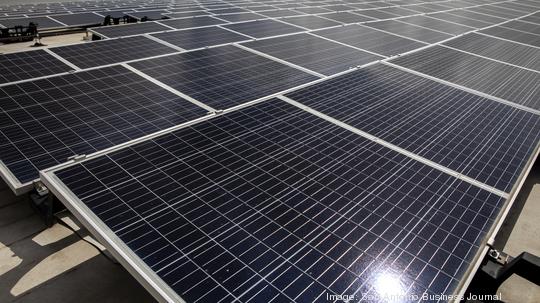
Emergency federal guidelines enacted by the Biden administration Monday which provide two-year tariff exemptions for certain South Asian countries could prove beneficial to the local solar industry, reducing costs and improving supply chain delays.
In March, the Commerce Department began looking into products from Thailand, Vietnam, Malaysia and Cambodia said to be bypassing U.S. anti-dumping regulations to curtail Chinese imports. Some solar companies expressed concern the investigation was slowing deliveries in an already-delayed supply chain.
In order to boost the solar industry and meet environmental goals, President Joe Biden invoked the Defense Production Act this week and provided a tariff exemption on panels from Southeast Asia. The Business Journal had the opportunity to catch up with Robert Miggins, CEO of Big Sun Solar, to see how these new regulations might affect San Antonio solar businesses.
What are the tariffs in question that are being lifted?
A solar panel has various parts that make it a full-blown module or panel. There are different tariffs depending on whether you're importing the wafers or cells or the entire panels, and the price differs based on how much of it originates in China. As an American, there are a lot of questions about why they are so cheap coming from China: Are they using child labor? Are they using forced labor? (They have) a questionable record on human rights. So that's the rationale for putting tariffs in place to begin with. What happened is Chinese manufacturers have tried to find a way around those tariffs by working through these other countries in Asia: Cambodia, Thailand, Malaysia and Vietnam. A lot of the Chinese companies have created warehouses for part of the finishing work outside of China to bypass these regulations.
Why did the federal government invoke emergency measures to support the industry?
At the urging of domestic solar manufacturers, who filed a complaint saying, 'China is slipping one over on you.' However, if the administration were to outright say, 'No more of that,' the solar panels coming out of those four countries would have the same tariff (as China), and that would force our prices even higher. (And) we have bought a lot of solar panels made in San Antonio, Texas, but we have also internationally bought from those other countries, though we have never bought directly from China. Pre-pandemic, we could give you panels from either location. It's 5 to 10% more expensive to buy American-made panels and their payback would 5 to 10% less. So a 7-year project becomes a 7.5-year project just by changing to all-American. The imported panels are a less expensive option.
What's the current supply chain situation for local solar businesses?
What has happened during the pandemic is that the global supply chain has just gotten really disrupted. The cost of an empty 53-foot shipping container used to be about $4,000 and now it's about $24,000. That gets really expensive. So that's a Covid thing — and it's because they're scarce. The cost of modules themselves worldwide have gone up, driven by the pandemic, scarcity and availability.
What's the practical impact of increased costs and slowed supply chain?
When we're talking to a customer who's deciding whether to buy solar, it starts with a financial discussion. Certainly the environmental attributes of solar matter deeply ... (But) the primary benefit to businesses is financial: the return on investment. If it's just the green component, some will say it's too expensive and it’s not a good enough deal. So we spend a lot of our time talking about the return for solar. When the return gets substantially worse, it's harder to grow your business — and right now, solar panels are more than 50% more expensive than they were before the pandemic. The cost of our materials is much more expensive to us than it was two years ago — though still lower than it was 10 years ago. The price has gone up and the wait time time on solar panels. What used to take us six weeks ... will arrive in six months or more. And to stockpile solar panels in a warehouse is difficult for smaller businesses to have the cash flow.
Will the new federal measures, including lifting the tariff, be beneficial to your business?
What matters to us as a company is trying to deploy as much solar into Texas as fast as possible, because climate change is a huge problem. It's real, and we're trying to do our small part to mitigate it. So if the customer wants to talk about financial payback, and that's the barrier to them saying yes to us, we're going to work to make that payback as fast as possible. If my goal is to deploy solar, than I need the best possible pricing, and if that means (importing from) Asia — not China, but those other countries — than we're going to offer that option. I think the new regulations will help the price. We can get solar panels a little bit cheaper, though not quite where they were pre-pandemic. It will also help us be accurate at the beginning with our quotes; it's hard enough to get projects down with all the other price increases. When a tariff comes in six months later — how do you price it? We could lose contracts we've already put time and effort and pre-engineering work into if someone else prices it lower. And maybe not immediately, but in the next quarter or two, I think it will help the wait time. We're looking forward to that.
Don't you think it's also important to boost solar manufacturing in the U.S.?
As an American citizen, thinking longitudinally, of course we should bring manufacturing jobs here. The problem is it doesn't happen quickly. You don't just spit out massive factories, and all the equipment to make solar panels is on delay. So there's the short-term element, and then what we're doing long-term. And while I greatly support us bringing that manufacturing onshore, I also appreciate the fact that administration's announcement means the possibility of a retroactive tariff being reimposed on panels if they came from those four countries is eliminated. That is really great for us near-term. It's a both-and, not an either-or. Long-term, we should give more of those jobs to those in the U.S. and train our youth to pursue careers in renewables.



